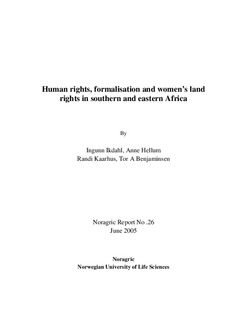Human rights, formalisation and women’s land rights in southern and eastern Africa
Report
Permanent lenke
http://hdl.handle.net/11250/2601809Utgivelsesdato
2005Metadata
Vis full innførselSamlinger
- Reports (LandSam) [94]
Sammendrag
Land is a vital resource for rural livelihoods. Establishing and clarifying land rights through formalisation has become a key issue in development policies that aim to promote more productive uses of land. This report looks at some land reform initiatives from a gendered human rights perspective. The human rights-based approach (HRBA) has a direct bearing on international and national land reform policies, facilitating gender equality through elimination of discrimination against women. The overall aim of this report is to make a contribution to the operationalisation of the HRBA. Chapter 2 focuses on different approaches to formalisation in different historical periods to date, starting with a discussion of the concept itself. In Chapter 3 the human rightsbased approach to development is developed in relation to women’s land rights, while Chapter 4 is an analysis of the approach to land policy found in the 2003 World Bank report. The country studies presented in Chapters 5–8 explore to what extent international and national formalisation initiatives are consonant with international human rights standards. By way of conclusion Chapter 9 addresses some cross-cutting issues concerning the approach’s efficacy and adequacy at the international, national and local levels.
Beskrivelse
The study on which this report is based, was commissioned by the Norwegian Agency of Development Cooperation (NORAD) as a joint project to the Institute of Women’s Law, Faculty of Law, at the University of Oslo (UiO) – through the Norwegian Centre for Human Rights – in collaboration with Noragric.

